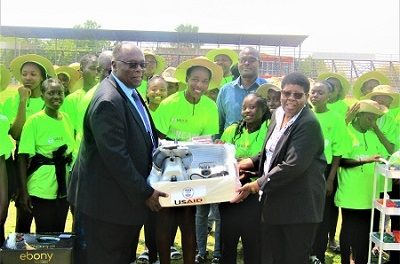
In May, the Leningrad NPP (a branch of Rosenergoatom JSC, Rosatom Power Division) included samarium-153 in the range of isotopes produced for medical purposes.
To generate this isotope, the NPP carried out successful pilot irradiation of the starting substance. Before that, the plant obtained the corresponding generation license. A pilot batch preceding the start of production is a mandatory requirement.
Director of the Leningrad NPP Vladimir Pereguda commented: “Today, radiopharmaceuticals with samarium-153 are widely used in palliative care to relieve pain that occurs with bone metastases; as well as in traumatology in the case of chronic musculoskeletal diseases. Samarium-153 isotope treatment can make it possible to avoid opioid analgesic use, while also inhibiting the progression of bone metastases and ensuring a lasting pain relief.”
The current Rosatom project envisages the medical isotope production at the Kursk and Smolensk nuclear power plants following the Leningrad NPP.
Successful development of the project in Russia may help expand the geography of production of radiopharmaceuticals with samarium-153 and other medical isotopes. This is also an important factor for Africa, as Rosatom has partnerships with foreign companies, including in medical development.
By gaining access to radioisotopes, countries on the continent can improve their healthcare systems. This helps increase the number of people who can receive the necessary medical care, and also improve the standard of living and life expectancy of local citizens.
Rosatom Power Division generates electrical and thermal energy at nuclear power plants. Rosenergoatom JSC includes all 10 nuclear power plants in Russia (as the concern’s branches), as well as the companies that support the generating company’s activities. Currently, Russian NPPs account for about 19% of the total electricity generated in Russia.
Rosenergoatom JSC is capable of rhythmically producing molybdenum-99, iodine-131, lutetium-177, samarium-153 at the power reactors of the Leningrad NPP, which are used in the diagnosis and treatment of various diseases; as well as radiation-doped silicon to meet the growing needs of the Russian electronics.
The Leningrad NPP (Sosnovy Bor, Leningrad region) boasts the largest installed capacity of all nuclear power plants in Russia, which is equal to 4400 MW. The plant is situated on the shore of the Gulf of Finland. It has two operative units with RBMK-1000 and two units with VVER-1200. After 45 years of operation, power units 1 and 2 with RBMK-1000 were shut down for decommissioning.
Two VVER-1200 units replaced them being commissioned in 2018 and 2021. These have a design service life of 60 years with a 20-year extension possibility. Two more new power units, 7 and 8, with VVER-1200 are scheduled to be commissioned in 2030 and 2032, respectively. They will replace the capacities of units 3 and 4 with RBMK-1000. Each VVER-1200 power unit will annually produce more than 8.5 billion kWh of electricity. For more than 20 years, the plant has been generating isotopes used throughout the world. This is the first domestic NPP producing isotopes.
Isotope JSC is the industry integrator of Rosatom products sales and promotion, the official supplier of products of Rosatom Isotope Network to the global market and a key supplier of the same to the domestic market. Isotope JSC has partnership relations with 170 foreign companies in 50 countries and about 600 companies in Russia, including health, manufacturing and research facilities.
Field-specific departments and large Russian companies place great importance to the increase of healthcare level as well as its availability, which constitute a significant factor in increasing the length and quality of life. Large Russian companies provide support for the comprehensive modernization of the healthcare system and development of the relevant infrastructure, Rosatom and its companies being actively involved in this work.
In the photo: Two nuclear power scientists hard at work.






